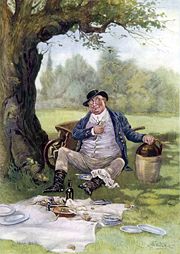|
Home
|
Apr 10, 2009
This week's themePeople who have more than one word coined after them This week's words ciceronian maudlin hermetic Cadmean victory pickwickian 
Mr. Pickwick, illustrated by Frederick Barnard
Next week's theme Terms from French  Discuss
Discuss Feedback
Feedback RSS/XML
RSS/XMLA.Word.A.Day
with Anu GargPickwickian
PRONUNCIATION:
(pik-WIK-ee-uhn)
MEANING:
adjective:1. Marked by generosity, naivete, or innocence. 2. Not intended to be taken in a literal sense. ETYMOLOGY:
After Samuel Pickwick, a character in the novel Pickwick Papers (serialized
1836-1837) by Charles Dickens. Mr Pickwick is known for his simplicity and
kindness.
In the novel Mr. Pickwick and Mr. Blotton call each other names and it
appears later that they were using the offensive words only in a Pickwickian
sense and had the highest regard for each other.Another term that arose from the book is Pickwickian syndrome, which refers to a combination of interlinked symptoms such as extreme obesity, shallow breathing, tiredness, sleepiness, etc. The character with these symptoms was not Mr. Pickwick, but Fat Joe, so the term is really coined after the book's title. The medical term for the condition is obesity-hypoventilation syndrome. USAGE:
"I kept a happiness diary, after the discovery by Professor Sonia
Lyubomirsky that collating one's daily blessings resulted in Pickwickian
good cheer."Hannah Betts; The Pursuit of Happiness is Driving Me to Despair; The Daily Telegraph (London, UK); Apr 3, 2009. "Mr. Tribe: Now, anybody reading that would realize that's a deadline only in a kind of Pickwickian sense. It's not a real deadline." A Transcript of Arguments in the Supreme Court Over the Florida Recount; The New York Times; Dec 2, 2000. "A Pickwickian chairman, rosy-cheeked, in frock coat and old-fashioned cravat, adopted the role of Santa Claus." Mungo MacCallum; Growing Up: The Day Had Come; Sydney Morning Herald (Australia); Jan 21, 1987. A THOUGHT FOR TODAY:
We have not passed that subtle line between childhood and adulthood until we move from the passive voice to the active voice - that is, until we have stopped saying 'It got lost,' and say, 'I lost it.' -Sydney J. Harris, journalist (1917-1986)
|
|
Subscriber Services
Awards | Stats | Links | Privacy Policy
Contribute | Advertise
Awards | Stats | Links | Privacy Policy
Contribute | Advertise
© 1994-2026 Wordsmith